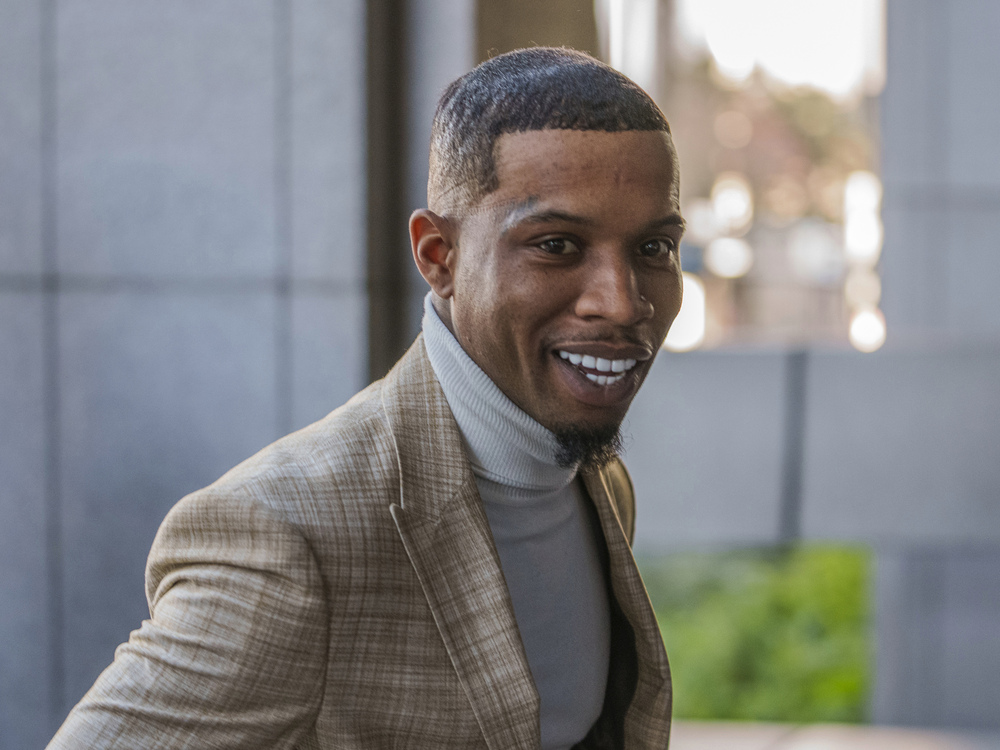
Rapper Tory Lanez was sentenced to 10 years in prison Tuesday in Los Angeles County Superior Court for assaulting fellow artist Megan Thee Stallion.
Last December, Lanez was found guilty of shooting Megan in the foot in July 2020 as they left a party at the home of celebrity Kylie Jenner.
At his conviction, the defendant was found guilty of all three charges prosecutors had brought against him: assault with a firearm, illegal possession of a firearm and negligent discharge of a gun for shooting the plaintiff.
Lanez spoke for several minutes at Tuesday's sentencing. He described the plaintiff as his friend — "someone I still care for dearly to this day" — regardless of her feelings about him. He talked about bonding with her over the loss of their mothers.
Megan did not appear in court for the sentencing, but issued a written statement, saying: "For once, the defendant must be forced to face the full consequences of his heinous actions and face justice."
When the shooting occurred, Megan and Lanez left the party along with a friend of hers and his bodyguard. The artists got into an argument in the car. He began shooting at her feet when she got out of the vehicle. She was hospitalized and underwent surgery.
Prosecutors had sought a hefty sentence for the rapper. After the shooting, they said Lanez launched "a campaign to humiliate and re-traumatize the victim" and "weaponized misinformation" on social media to turn public opinion against Megan.
Lanez's lawyers, meanwhile, were hoping for rehabilitation over prison time. Judge David Herriford heard discussions about the rapper's struggles with alcohol, his childhood trauma and mental health, as well as statements and letters written supporting the defendant.
There has been less coverage of this case in the media than other similarly high-profile trials involving male and female celebrities in recent times, perhaps most notably the Johnny Depp vs. Amber Heard case.
But this one struck a chord with many people because of the negativity Lanez's fans and fellow artists directed against Megan. For example, Drake, in one of his songs, implied that Megan lied about being shot.
District Attorney Alex Bott described the shooting in court Tuesday as "an act of misogyny towards Megan."
Many cultural critics agree.
Gabby Bulgarelli, senior producer of NPR's hip-hop podcast Louder Than a Riot, followed this case for months.
"Being a woman going up against this male-dominated industry, Megan is really fighting an uphill battle," Bulgarelli said in an interview for NPR's It's Been A Minute. "Hip hop was born out of a need to speak truth. But in a lot of ways, people who do that are vilified and, and further disenfranchised."
In the immediate aftermath of the shooting, Megan told police that she had stepped on broken glass. During her testimony at Lanez's trial last December, she said she was so afraid of the police and Lanez that she couldn't immediately tell the truth. "I don't feel safe in the car. I don't feel safe with the police," she said through tears.
She also testified that Lanez had offered her and her friend, who was in the car the day the shooting occurred, $1 million each to keep quiet about the incident.
On an album released two months after the shooting, Lanez included lyrics denying that he had shot her and asserting that he had been framed.
The maximum sentence for the crimes Lanez was convicted of is 22 years and eight months in prison. However, due to a recently passed California law meant to measure criminal justice reform, courts are now required to impose the middle length of a possible prison term unless there are aggravating circumstances.
Judge Herriford had previously denied Lanez's request for a retrial. The Canadian citizen also potentially faces deportation from the United States after he serves his sentence.







